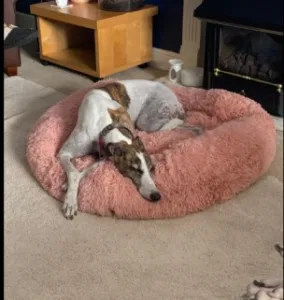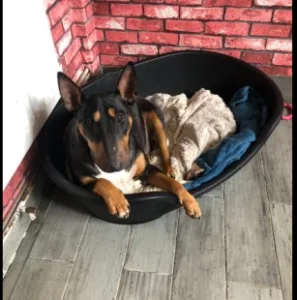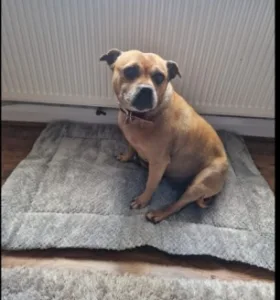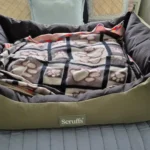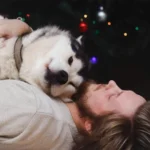Dogs chewing on their beds is a typical issue that many pet parents face. It could appear to be innocuous from the start; however, it can prompt a few issues. Besides the fact that it affects the actual bed, it can also present dangers to the dog if they ingest any pieces of texture or stuffing. Also, this behavior can be characteristic of fundamental issues like boredom, anxiety, or inappropriate preparation. Addressing this is critical for the prosperity of both the dog and the owner. For the dog, it prevents potential digestive issues and ensures they have a comfortable spot to rest. Moreover, addressing the root cause of the chewing way of behaving can work on their general emotional and mental health.
Understanding Why do dogs chew their beds
Anxiety:
Dogs, similar to us, get restless. Probably, they’re feeling upset when you’re nowhere to be found, or they’re anxious over something in their current Situation. Saw helped them adapt to those Emotions, similar to how we could chew our nails when we’re scared. That’s why dogs chew their bed.
Boredom:
Imagine being stuck inside the entire day with lots of idle time – it’d get pretty dull, isn’t that so? Dogs feel something very similar. When they’re tired, they could fall back on chewing on their beds to breathe easily. When dogs are alone for too long, are very hyper, or don’t get exercise, they become bored and look for stimulation by chewing.
Teething:
Little dogs, particularly, go through a phase where their teeth are coming in. Very much like human children, this can be awkward for them. Chewing eases that inconvenience and helps their new teeth get through. Thus, they could see their bed as a helpful chew toy.
Stress:
Dogs can experience stress in light of multiple factors, like changes in their current environment, separation from their owners, or even loud noises like rainstorms. Chewing might be a survival strategy to lighten these sentiments.
Sensitivities or Skin Disturbances:
Sometimes, dogs chew on their beds since they’re experiencing allergies or skin irritations that make them stressed and awkward. They might chew to reduce itching or irritation.
Behavioral Issues:
Certain behavioral issues, like excited chewing or a damaging way of behaving, may come from basic mental or emotional issues. Talking with a veterinarian or creature behaviorist can help resolve these issues.
Strategies to Stop Dog Chewing Bed
Provide Non Chewable Beds:
Choosing a plastic dog bed like Ferplast plastic dog bed or Petface plastic dog bed isn’t about comfort; it’s about security as well. Our fuzzy companions love to chew on things they shouldn’t. In any case, with a plastic dog bed, you can inhale simply knowing it’s non-chewable. That means no more worrying over your little pup ingesting destructive materials or destroying their bed in the process.
Plastic beds offer durability that fabric or foam doesn’t give. Plastic beds are sturdy and strong, rising up to even the most excited chewers. In addition, they’re not difficult to clean — wipe them with cloth, and they’re great all around. Don’t bother agonizing over stains or scents waiting around.
While picking a bed for your shaggy companion, consider the advantages of a plastic dog bed. With beds like Ferplast and Petface, you’re not simply putting resources into comfort — you’re putting resources into your pet’s prosperity.
Provide Chewable Toys:
- Puzzle Toy: Treat your pet to a mental activity with these canny puzzle toys. Essentially, cover a delectable treat inside, and watch as your furry friend uses their paws and nose to settle the riddle and warranty their award.
- Chew Train: Already the chew train! This durable flexible toy is planned to get through even the hardest chewers, while its unique train shape adds an extra part of comfort to break.
- Kong Toy: It is made of rubber and is very strong and will hold up no matter how much your furry friend chews.
- Nylon toys: These are made of nylon and are very durable and can withstand as much chewing as your dog likes.
- Kongs Toy: This is made of durable rubber that helps your dog chew so they don’t chew up their bed. It has different sizes for all breeds of dogs.
- Gauntlets: These are toys made of solid rubber that are indestructible. It is ideal for aggressive dogs that chew their bedding aggressively. It comes in a variety of shapes and sizes.
- Bonebones: Shaped like a bone, this toy is made of nylon, which dogs love and is great for tough chewers.
All these toys are completely safe for dogs.
Regular Exercise:
Don’t let your dog get bored and leave him alone. When he is left alone, he gets bored, and that is why he starts chewing on his bed. Dogs need physical exercise as well as mental stimulation to maintain overall health. Owners should keep their dogs engaged in activities that can help them heal, such as toys that can help keep the brain healthy and keep them from chewing.
Take your dog for a walk every day. A walk will give him physical and mental relaxation and will also keep him away from the habit of chewing and he will not get bored. Take your dog to new trails and parks so that he doesn’t get bored of any trails and parks.
Play with your dog Hide treats around the house or yard before a walk. Let your dog sniff you after your walk to find a rewarding post-exercise treat. Instead of throwing the ball in a straight line, try to hide it or throw it in different directions so your dog uses his problem-solving skills to find it. By playing with the dog and doing different activities with him, he will stop and forget the habit of chewing.
Use of Deterrents:
- Deterrent sprays: There are many sprays designed to stop dogs from chewing. These sprays contain ingredients that dogs do not like, such as bitter apple or citronella. Some dogs don’t mind the taste, so these sprays may not work for all dogs. Choose a spray that is safe for your dog.
- Bitter-tasting substances: You can also put a bitter-tasting substance on the things your dog likes to chew. There are many commercially available bitter-tasting sprays and gels, or you can make your own at home using a mixture of water and lemon juice or grapefruit juice.
- Deterrent sounds: Some dogs are startled by loud noises, so you can try using a deterrent sound to stop them from chewing. You try using a can of compressed air to startle your dog. Be sure to only use humane Stopping sounds and do not use them to punish your dog.
What can i spray on dog bed to stop chewing?
To stop your dog from chewing on the bed, you can use a pet-safe deterrent spray that has a bitter taste dogs dislike, such as a bitter apple or citrus-based spray. These sprays are designed to be harmless to your dog but unpleasant enough to discourage chewing. Apply the spray lightly on areas where your dog tends to chew, reapplying as needed. Be consistent with the application and combine it with positive reinforcement by rewarding your dog when they chew on appropriate toys instead. This method helps deter the unwanted behavior while encouraging better habits.
Training and Positive Reinforcement:
Obedience training is like a magic key that makes your dog behave well. It’s not just about teaching them tricks, it’s about giving them the tools they need to understand what’s expected of them and behave appropriately in any situation.
By learning the basics like “sit”, “stay” and “come”, your dog becomes a good dog. You’ll both be less stressed, and you can confidently take your furry friend to more places. Obedience training is good for your dog, it’s about creating a communication system that strengthens your bond and makes for a happy, well-adjusted dog.
Rewards encourage your dog to repeat the ideal way of behaving in light of the fact that they partner it with something positive. Good behavior strengthens the positive relationship between you and your dog. Avoid punishment if your dog makes a mistake. Instead, gently redirect them and try again. Positive reinforcement is about building on good things!
Attention and Interaction:
Many objects help stop a dog’s anxiety-driven chewing, but one of the most important is providing plenty of attention and companionship. Dogs are social creatures that crave interaction, and feelings of loneliness or boredom can trigger annoying chewing. When left alone for long periods of time, dogs become lonely and stressed, destructive chewers. Giving your dog lots of attention and companionship helps them feel secure and loved, reducing anxiety.
Dogs are social creatures who thrive on conversation and playtime. Engaging in these activities with your furry friend is a great way to bond you and your dog, provide mental and physical stimulation, and build a strong, trusting bond.
- Hide-and-Seek: This game is an incredible method for drawing in your dog’s feeling of smell and critical thinking abilities. Have your dog stand by in an assigned spot while you hide away. Once covered up, call out to your dog in an excited voice and encourage them to track down you. At the point when they do, give them commendations and treats!
- Tug of War: This fun game is a great way to bond with your dog and provide a healthy outlet for their natural tugging instincts. Use a strong rope toy that is safe for both of you to play with. Be sure to let your dog win occasionally to keep the game fun and engaging.
Limiting Access:
When you can’t directly supervise the dog, keep the dog in places where it can find things to chew on, such as furniture, electrical cords, and rooms. Confine your dog to a small, secure area, such as a crate or playpen.
- Crates are a safe and secure place for your dog when you can’t supervise them. Provide them with comfortable bedding and chew toys.
- Playpens offer more space than crates and can be a good option for older dogs who are not crate-trained. Fill the playpen with safe chew toys and supervise playtime.
- A crate is a safe and comfortable place for your dog. Crate training is ideal for short-term confinement, as it limits opportunities for chewing due to boredom or frustration.
Creating a Safe Space:
If your dog is startled by loud noises, choose a location away from windows and exterior walls. Choose a quiet area of your home where your dog can rest. It could be a spare bedroom, a corner of the living room, or even a crate. Make sure your dog can easily get in and out of their safe space without any problems. Give your dog good support for their joints. Memory foam dog beds or orthopedic dog beds are great options, especially for senior dogs.
What Not To Do:
Dogs don’t associate past actions with punishment very well. Screaming or hitting them after they chew something won’t teach them not to do it again. It can actually harm your relationship with your dog. Things like spraying with water or using a mild deterrent may not be strong enough to discourage chewing, especially for a determined dog.
These approaches focus on negative reinforcement, which is not very effective in combating chewing behavior. Instead, focus on understanding why your dog chews and providing appropriate outlets for that need to chew.
Conclusion:
In this article we discuss that Chewing is a normal dog behavior, but it’s important to address it to prevent them from ingesting harmful materials and to protect your belongings. Patience, consistency, and understanding are key to stopping dog chewing behavior. Address the underlying cause of the chewing, such as anxiety, boredom, or teething. Exercise helps relieve boredom and tire out dogs so they’re less likely to chew. Playing with your dog and providing companionship helps reduce anxiety and boredom which can lead to chewing.
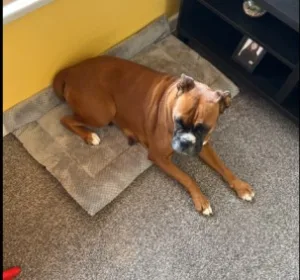
FAQS
How do I stop my dog from tearing up her bed?
To stop your dogs from chewing on the bed, provide them with chew toys made of different materials such as rubber, rope, and nylon. And engage in physical and mental activities with dogs to distract them from chewing.
Why does my dog chew its bed?
Dogs often chew their beds because they are feeling isolated or anxious. When a dog is scared or anxious, they relieve their stress by chewing and tearing at their bedding to relieve the anxiety.
At what age do dogs stop chewing beds?
The chewing stage is usually over 6 months of age. As dogs mature, they need to chew their teeth less. But when they feel bored, they may start chewing again.
How do I stop my dog from destroying things when I’m gone?
Make sure your dog gets plenty of exercise before you leave, a nice walk or playtime in the yard can help burn off energy. You can also provide puzzle toys or Kongs filled with treats to keep them mentally engaged. When a dog is tired, it is less likely to chew.
Does vinegar stop dogs from chewing?
Both lemon juice and vinegar can be used. At the same time, vinegar is sometimes more effective. Both prevent dogs from chewing.
How to get my german shepherd to stop chewing on the bed?
Give your German Shepherd chew toys and ensure they get enough exercise to curb boredom. Use deterrent spray on the bed and reinforce good behavior with rewards.


